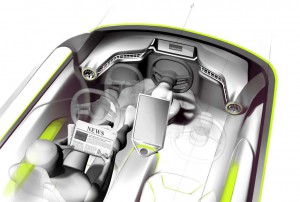With the first autonomous vehicles likely heading to showrooms within the next decade, there’s little doubt life on the road will begin to change. But exactly how? That’s a question garnering a lot of attention these days. If our cars can handle the morning commute on their own, what will we be doing during our morning commute?
One thing seems certain, self-driving vehicles will “redefine the relationship between man and machine,” suggests Frank Rinderknecht.
He’s better known as the visionary behind Rinspeed, a Swiss consulting firm that offers its take on the automobiles of the future with a series of concept vehicles that regularly appear at the annual Geneva Motor Show.
And the upcoming show will feature Rinspeed’s new Budii, which the firm calls a “trans-urban concept car.”
The electrically-powered prototype – which appears to be based on the new BMW i3 electric vehicle – is designed to be the “perfect chauffeur that quickly adapts to the habits and preferences of its ‘boss.’”
Like other autonomous vehicle concepts – including one Mercedes-Benz will formally unveil at the Consumer Electronics Show in Las Vegas next month – the Rinspeed Budii starts off with the idea that we’ll be able to hand off driving duties to our cars, using the morning commute to read, catch up on e-mail or even grab a few extra minutes of sleep.
(Click Here to check out the Mercedes autonomous vehicle prototype.)
It doesn’t go the Google route, however. It does allow a motorist to be actively engaged with the act of driving. Indeed, its flexible steering wheel can be shifted to allow either front seat passenger to steer the vehicle. Or the wheel can be parked in the center position to go back to autonomous mode.
Rinspeed, meanwhile, envisions a vehicle capable of interacting both with its passengers and the environment.
(Survey shows motorists like the idea of autonomous vehicles — but remain wary. Click Here for more.)
Like many industry observers, the Swiss consultant predicts that the coming of autonomous technology “will take place in stages.” Self-driving vehicles, suggests Rinderknecht, “will keep learning each day, and as a result will get better and better at mastering the complex challenges of modern-day private transport.”
In the end, he is clearly a believer. Like many autonomous advocates, Rinderknecht believes that the technology will yield significant savings, among other things, in human lives by reducing the daily crash toll.
The technology “will be less prone to err than humans,” he contends, though he also acknowledges that “we will have to accept” that autonomous vehicles “will not be perfect.” The goal is to have them steadily improve as they learn to engage in the challenging task of driving.
(Click Here to find out why the car key could soon disappear.)



OK now I understand… We’ll have road rage inside the car when two different people want to drive at the same time. Now I understand why autonomous cars are being created. LOL